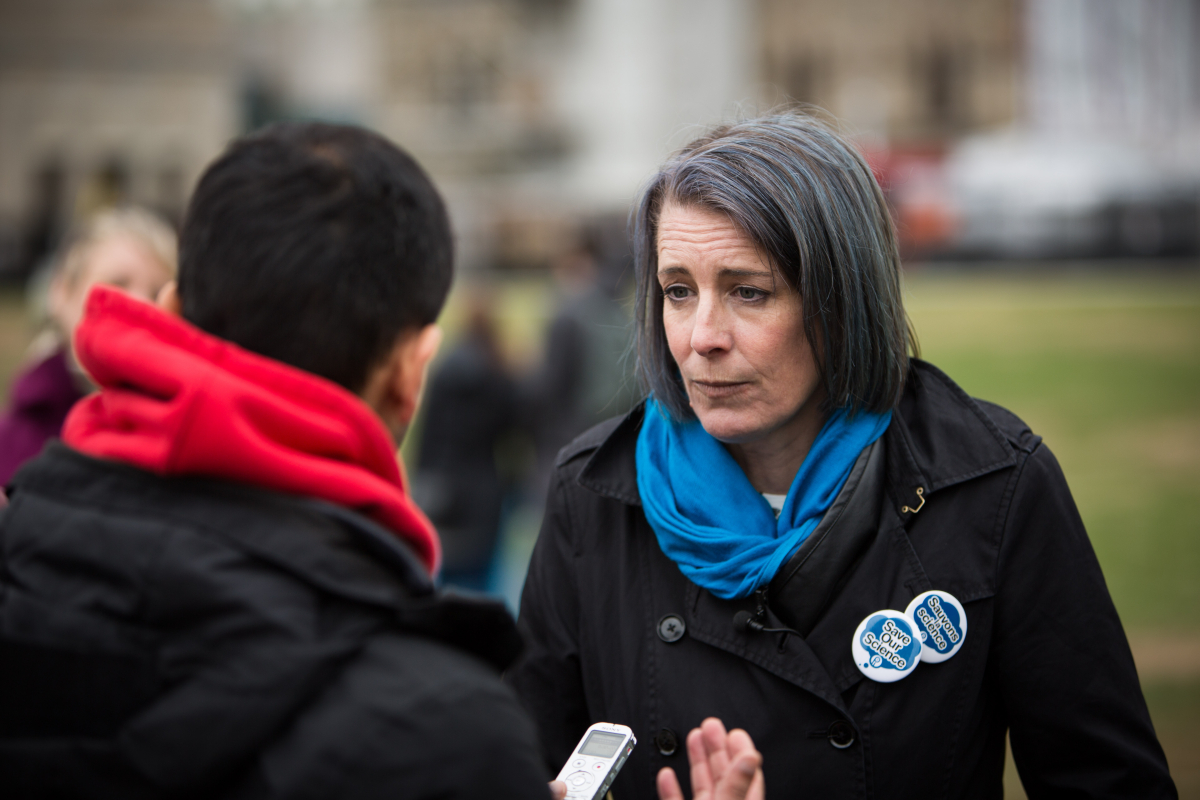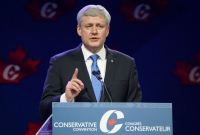Support strong Canadian climate journalism for 2025
Canada has introduced new rules to shield its federal scientists and researchers from political interference and enshrine evidence-based decision-making in government.
The policy on scientific integrity, which was published online the morning of July 30 by the office of Canada’s chief science advisor, Mona Nemer, is meant to boost public trust in the credibility of public research.
It has directives against falsifying data, destroying records, and plagiarizing and ignoring conflicts of interest, and includes a process to deal with infractions. Once adopted, the policy would apply to all government workers involved in scientific undertakings, such as employees who communicate research to the public — not just the scientists themselves.
“You and I, as citizens, need to be confident that when the government says that this is what the science informs, that the science is conducted in an objective manner," said Nemer in an interview.
The initiative to protect researchers comes after a federal investigation found the government of former prime minister Stephen Harper violated its own transparency rules by muzzling federal scientists. It also comes as facts and evidence are under increasing attack from governments such as the Trump administration in the U.S., while misinformation is spreading globally on social networks.
During Canada's 2015 federal election campaign, the Liberals promised to allow scientists to speak freely about their work and consider scientific analyses when making decisions.
The new federal policy, expected to be in place in departments and agencies by the end of the year, does not have the force of law, or of signed contracts. Those involved in its development admit that it could be easily revoked by a future government.
But by setting formal expectations for the conduct of public servants and the protection of scientific work, its advocates hope it will be difficult to knock down.
“Researchers and scientists shall have the right, and are encouraged, to speak about or otherwise express themselves on science and their research without approval or pre-approval and without being designated as an official spokesperson,” the policy reads.

Departments can modify, but union is watching
About a year after the Liberals came to power, a Dec. 9, 2016 Memorandum of Agreement between the federal Treasury Board and Professional Institute of the Public Service of Canada (PIPSC) called for scientific integrity to be enshrined in collective agreements.
PIPSC, a union, and the Treasury Board signed two such agreements on May 15 and June 1, 2017, with departments and agencies who boast members of two main scientific research and applied sciences employee groups, called the "RE" and "SP" groups.
The federal government, PIPSC and the science advisor's office then formed a working group that hammered out the details for a "model policy" or template that departments and agencies will tweak to suit their needs.
This model policy was formally approved on July 13 by a committee of bureaucrats from the affected areas of government, Nemer confirmed. The collective agreements call for the departmental scientific integrity policies to be completed within 18 months of signing, or by the end of 2018.
“Of all things that we work on with government, this has been a real model of that collaboration," said PIPSC president Debi Daviau. “It really does address, from a very pure science and research lens, what needs to be done in departments to ensure scientific integrity in decision-making."
Daviau said the union will have representatives in each department taking the lead on implementing the policy. That will involve more people and co-ordination between unions and government, she said.
Nemer's office said departments are being "encouraged" to adopt the model policy as is, but are not obligated to do so. They can remove, edit or modify clauses as long as it continues to reflect the document's central principles.
The union will be watching, said Daviau.
“We suspect that there will be different nuances in each department, but what we won’t accept is a drastic difference, because it goes against the whole intent of putting these policies in place,” she said.
“If we were to find that one department in particular was fighting the principles that are defined in that policy, we may bring in the other partners to set them straight.”

Policy not law, but popular and defendable
The policy does not have the force of law, and it would be relatively straightforward for a future government to order the departments to revoke or change their versions. Both Daviau and Nemer downplayed the feasibility of that possibility.
“We’re really hoping that this is going to survive politics, parties and so on," said Nemer. “As I always say, science should really not be affected by ideology. By definition, science is objective so it shouldn’t be swayed one way or another.”
That being said, she added, "its implementation depends on human beings and individuals." But she said she was encouraged by the "enthusiasm" from top bureaucrats and scientists about the initiative.
“Everybody seems almost happy and relieved that we have something that is going to frame the responsible conduct of research, and help everyone understand their roles, responsibilities and so on."
Daviau agreed that the language in the collective agreements would be easier to protect than the policies. Scientists would "likely go on strike" to keep scientific integrity in their agreements, she said, while "policy can be really changed quite simply."
But given the attention Canadians paid to muzzled scientists during the previous government, she said, “It’ll be hard for any government to walk that back...it may not be politically expedient."
“Scientists are so committed to their work and their projects that they are not militant — they are not fighting for their terms and conditions of employment, they’re not fighting for their wage increases — what got scientists excited was when they [the Harper government] started to meddle with their work."

Scientist approvals put at centre of policy
Katie Gibbs, executive director of Evidence for Democracy, a group that has advocated to enshrine science integrity in policy, said she was impressed overall with the document.
“It’s very strong, and I’m certainly hoping the departments and agencies will adopt it wholesale,” she said, “because a lot of what’s in here is very, very good, and meets a lot of the requirements of what we were looking for.”
Gibbs welcomed several clauses in the policy as affirmations that the government was thinking broadly about transparency, political interference, control of information and conflicts of interest. She pointed to clauses underlining that departmental science should be free from “political, commercial, client and stakeholder interference."
Another clause notes that researchers or scientists should review and approve the publication of public communications describing their work; even if they don’t wish to reveal their authorship, they should be consulted about whether the work is being accurately interpreted and described.
“Often the concern under the previous government was that the communications team might write up a brochure or press release, interpreting a scientist’s research, get it wrong, and put it out — with no requirement that they actually take it back to the scientist,” said Gibbs.
The policy also says research and scientific information produced by government contractors, who participate or assist with government science, should be “disseminated in a timely and transparent manner” unless there are “clear and compelling reasons for not doing so.”
The phenomenon of experts paid by the natural resources sector to carry out government scientific work has led to accusations of conflict of interest and problematic self-monitoring in British Columbia under the province’s so-called “professional reliance” system. A recent, independent report on the subject found that B.C. government ministries don’t have enough resources or expertise on professional governance.
Gibbs said in light of these B.C. revelations, it was good to see that the federal policy indicates that "contractors and/or collaborators" providing services are encouraged to comply with its provisions.
The document also distinguishes between public remarks from scientists that include “comments or recommendations” about policy matters, and those that don’t. If those remarks are centered on policy, it says, a manager or supervisor’s approval is required.
Gibbs said she understood the government needed to put that kind of clause in place, although she’d prefer the government didn't have to differentiate.
“I heard this personally, probably, at least five to seven examples of this — where scientists had been told not in writing that the publication had not been approved, and it seemed like this was specifically because the managers were avoiding having a paper trail" that would prove government interference, she said.
Asked about the distinction between public remarks that touch on policy and those that don't, Nemer said it represented the difference between communicating objective research and evidence, and providing personal commentary on how those findings should inform political decisions.
"For example, if you’re doing research around water pollution...it's very clear. Once you say that the policy is to enforce certain things or to close down, or allow or not allow a development of certain farms, that becomes a policy issue," she said.

Under development as muzzling probe released
Last September, Nemer was introduced as Canada’s chief science advisor, and her marching orders were to provide advice on developing “guidelines” to ensure the Liberals’ campaign promises on open access to science and evidence-based decision-making were implemented.
By March 2018, Nemer said she had signed the terms of reference establishing a governance committee to implement a science integrity policy.
The working group received roughly 200 comments about the draft from 17 different departments and agencies. Some departments sought and received a deadline extension, pushing back the feedback period from April 30 to May 15.
The development of that science integrity policy was well underway when Canada's former information watchdog, Suzanne Legault, published her federal investigation revealing that the Harper government had violated transparency and communications rules by muzzling federal scientists.
The report, dated Feb. 28 of this year, came with four recommendations for the government to stop future muzzling. First, it said that Nemer must be “independent from the executive” and play a role in ensuring that government science is “fully available to the public and that government scientists are able to speak freely about their work."
Second, the report called on the government to collect data on publicly-released scientific data, and for amendments to Canada's Access to Information Act to require heads of government institutions to proactively disclose information “that could affect public safety, public health or environmental protection.”
Finally, it called for the Treasury Board to provide training for public servants on their “rights and obligations” in making science information public, identify best practices in disclosing information, and “identify and correct any weaknesses” in the ability of public servants to disclose science.
Earlier this year, Nemer revealed her office was working with the Canada School of Public Service — a federal institute that offers training and education for public servants — to prepare coursework for employees and managers to learn more about science communication and evidence-based policy.
— with files from Mike De Souza







Comments
Trudeau giveth and Trudeau taketh away, usually without rhyme or reason that I can fathom. But this is on the the good giveths.
We have seen a continuation of bureaucratic stifling of facts in Alberta, as well. It is essential for our country that freedom for scientists to speak is enshrined in all of our provinces and territories.
I am a biologist (Ph.D., animal behaviour/ecology), and am very glad to read about the policy outlined in this article. In addition to the main statement, two other points are particularly satisfying: a) that the role of consultants will come under scrutiny and b) that communicators of research must check with the researchers for accuracy before publicizing the results. However, it's easier to agree on a policy--which can be changed--than it is to develop a law that all interested parties will accept. In spite of the reassurances of Ms. Daviau and Dr. Nemer that it will set a precedent that will be difficult to alter, events south of our border and elsewhere in the world are incentives to develop legislation.
Furthermore, the policy covers only federal scientists and communicators, not researchers at universities and colleges. I suggest that the policy be amended to include all researchers receiving any federal funds for their projects. This would greatly widen the sphere of protection and the areas of research covered.
I would also like to see the provinces sign on either to the policy as it stands or to a similar one developed locally.
The history of science, as the west currently defines it, is relatively young. If you expand the word science to its original meaning of "knowledge" it opens up greater longevity, depth and breadth. That history is a lengthy litany of human thought, endeavor, and oppression. Prior to the written history available to western societies, the Chinese had written "knowledge" of various kinds recorded on slivers of bamboo, strung together to form scrolls. Repeatedly, in its much longer history than ours, changes of regime routinely erased the recorded knowledge of the previous regime in order to impose its own laws, beliefs, interpretations on the society and, in the process proclaim them as uniquely their own.
Viewing the current upheavals of received wisdom emerging from too many self deluding mouths, this ancient cycle of eradication and appropriation with self serving amendments appended, has resurfaced under the rubrics of "fake news" or conversely, "new truths". that owe nothing to those who preceeded us.
This new generation of proud "know nothings" follows in a very ancient tradition indeed. Apparently, no modern innovations like Gutenberg's press, nor the internet can be counted on to retain a memory of truth.
The medical profession, supposedly governed by the pledge "First, do no harm" is being overrun by the vermin of profit: peddlers of ineffective at best remedies, or at worst, remedies that do as much harm as good; peddlers of "insurance" whose financial power perverts and impedes the processes of healing; and the bureaucrats, the lobbyists, the politicians whose only interest in health is how much profit can be wrung from it. What is true of Medicine is equally true of other fields of knowledge. The Scientists who struggle to overcome all these impediments are being thwarted, suppressed and manipulated at every turn.
Western science, after years of struggle have finally arrived at a set of guiding principles known as the scientific method. When rigourously applied, the method is the most reliable means of advancing knowledge. The method can be abused, twisted and falsified but eventually, if adherred to, truth will out.
The proposed federal policy reasonably builds on the integrity inherent in the method. Any deviation from this policy should be a loud klaxon, warning us that someone, somewhere is tampering with the wiring of the method.
Again, please present this July 30th item as Related to the real top story (https://www.nationalobserver.com/2018/08/24/news/trudeau-liberals-accus…), not in the list presented in my email of Aug 27th!